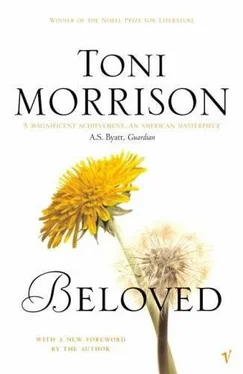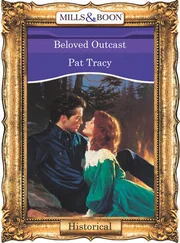"Let me tell you how I got my name." The knot was tight and so was the bow. "They called me Joshua," he said. "I renamed myself," he said, "and I'm going to tell you why I did it," and he told him about Vashti. "I never touched her all that time. Not once.
Almost a year. We was planting when it started and picking when it stopped. Seemed longer. I should have killed him. She said no, but I should have. I didn't have the patience I got now, but I figured maybe somebody else didn't have much patience either-his own wife. Took it in my head to see if she was taking it any better than I was. Vashti and me was in the fields together in the day and every now and then she be gone all night. I never touched her and damn me if I spoke three words to her a day. I took any chance I had to get near the great house to see her, the young master's wife. Nothing but a boy. Seventeen, twenty maybe. I caught sight of her finally, standing in the backyard by the fence with a glass of water. She was drinking out of it and just gazing out over the yard. I went over.
Stood back a ways and took off my hat. I said, 'Scuse me, miss. Scuse me?' She turned to look. I'm smiling. 'Scuse me. You seen Vashti?
My wife Vashti?' A little bitty thing, she was. Black hair. Face no bigger than my hand. She said, "What? Vashti?' I say, 'Yes'm, Vashti.
My wife. She say she owe you all some eggs. You know if she brung em? You know her if you see her. Wear a black ribbon on her neck.'
She got rosy then and I knowed she knowed. He give Vashti that to wear. A cameo on a black ribbon. She used to put it on every time she went to him. I put my hat back on. 'You see her tell her I need her. Thank you. Thank you, ma'am.' I backed off before she could say something. I didn't dare look back till I got behind some trees.
She was standing just as I left her, looking in her water glass. I thought it would give me more satisfaction than it did. I also thought she might stop it, but it went right on. Till one morning Vashti came in and sat by the window. A Sunday. We worked our own patches on Sunday. She sat by the window looking out of it. 'I'm back,' she said.
'I'm back, Josh.' I looked at the back of her neck. She had a real small neck. I decided to break it. You know, like a twig-just snap it. I been low but that was as low as I ever got."
"Did you? Snap it?"
"Uh uh. I changed my name."
"How you get out of there? How you get up here?"
"Boat. On up the Mississippi to Memphis. Walked from Memphis to Cumberland."
"Vashti too?"
"No. She died."
"Aw, man. Tie your other shoe!"
"What?"
"Tie your goddamn shoe! It's sitting right in front of you!
Tie it!"
"That make you feel better?"
"No." Paul D tossed the bottle on the ground and stared at the golden chariot on its label. No horses. Just a golden coach draped in blue cloth.
"I said I had two things to say to you. I only told you one. I have to tell you the other."
"I don't want to know it. I don't want to know nothing. Just if Judy will take me in or won't she."
"I was there, Paul D."
"You was where?"
"There in the yard. When she did it."
"Judy?"
"Sethe."
"Jesus."
"It ain't what you think."
"You don't know what I think."
"She ain't crazy. She love those children. She was trying to out hurt the hurter."
"Leave off."
"And spread it."
"Stamp, let me off. I knew her when she was a girl. She scares me and I knew her when she was a girl."
"You ain't scared of Sethe. I don't believe you."
"Sethe scares me. I scare me. And that girl in her house scares me the most."
"Who is that girl? Where she come from?"
"I don't know. Just shot up one day sitting on a stump."
"Huh. Look like you and me the only ones outside 124 lay eyes on her."
"She don't go nowhere. Where'd you see her?"
"Sleeping on the kitchen floor. I peeped in."
"First minute I saw her I didn't want to be nowhere around her.
Something funny about her. Talks funny. Acts funny." Paul D dug his fingers underneath his cap and rubbed the scalp over his temple.
"She reminds me of something. Something, look like, I'm supposed to remember."
"She never say where she was from? Where's her people?"
"She don't know, or says she don't. All I ever heard her say was something about stealing her clothes and living on a bridge."
"What kind of bridge?"
"Who you asking?"
"No bridges around here I don't know about. But don't nobody live on em. Under em neither. How long she been over there with Sethe?"
"Last August. Day of the carnival."
"That's a bad sign. Was she at the carnival?"
"No. When we got back, there she was-'sleep on a stump. Silk dress. Brand-new shoes. Black as oil."
"You don't say? Huh. Was a girl locked up in the house with a whiteman over by Deer Creek. Found him dead last summer and the girl gone. Maybe that's her. Folks say he had her in there since she was a pup."
"Well, now she's a bitch."
"Is she what run you off? Not what I told you 'bout Sethe?"
A shudder ran through Paul D. A bone-cold spasm that made him clutch his knees. He didn't know if it was bad whiskey, nights in the cellar, pig fever, iron bits, smiling roosters, fired feet, laughing dead men, hissing grass, rain, apple blossoms, neck jewelry, Judy in the slaughterhouse, Halle in the butter, ghost-white stairs, chokecherry trees, cameo pins, aspens, Paul A's face, sausage or the loss of a red, red heart.
"Tell me something, Stamp." Paul D's eyes were rheumy. "Tell me this one thing. How much is a nigger supposed to take? Tell me.
How much?"
"All he can," said Stamp Paid. "All he can."
"why? Why? Why? Why? Why?"
124 WAS QUIET. Denver, who thought she knew all about silence, was surprised to learn hunger could do that: quiet you down and wear you out. Neither Sethe nor Beloved knew or cared about it one way or another. They were too busy rationing their strength to fight each other. So it was she who had to step off the edge of the world and die because if she didn't, they all would. The flesh between her mother's forefinger and thumb was thin as china silk and there wasn't a piece of clothing in the house that didn't sag on her. Beloved held her head up with the palms of her hands, slept wherever she happened to be, and whined for sweets although she was getting bigger, plumper by the day. Everything was gone except two laying hens, and somebody would soon have to decide whether an egg every now and then was worth more than two fried chickens. The hungrier they got, the weaker; the weaker they got, the quieter they were-which was better than the furious arguments, the poker slammed up against the wall, all the shouting and crying that followed that one happy January when they played. Denver had joined in the play, holding back a bit out of habit, even though it was the most fun she had ever known.
But once Sethe had seen the scar, the tip of which Denver had been looking at whenever Beloved undressed-the little curved shadow of a smile in the kootchy-kootchy-coo place under her chin-once Sethe saw it, fingered it and closed her eyes for a long time, the two of them cut Denver out of the games. The cooking games, the sewing games, the hair and dressing-up games. Games her mother loved so well she took to going to work later and later each day until the predictable happened: Sawyer told her not to come back. And instead of looking for another job, Sethe played all the harder with Beloved, who never got enough of anything: lullabies, new stitches, the bottom of the cake bowl, the top of the milk. If the hen had only two eggs, she got both. It was as though her mother had lost her mind, like Grandma Baby calling for pink and not doing the things she used to. But different because, unlike Baby Suggs, she cut Denver out completely. Even the song that she used to sing to Denver she sang for Beloved alone: "High Johnny, wide Johnny, don't you leave my side, Johnny."
Читать дальше











